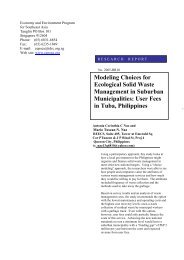systems research - the IDRC Digital Library - International ...
systems research - the IDRC Digital Library - International ...
systems research - the IDRC Digital Library - International ...
Create successful ePaper yourself
Turn your PDF publications into a flip-book with our unique Google optimized e-Paper software.
more for intervened farmers and 4.6% more for control farmers. The yield was 54%<br />
more than <strong>the</strong> yield of maize in <strong>the</strong> lowland areas in 1984. The yield potential of<br />
improved maize varieties under well-managed conditions exceeds 5 t/ha . Given this<br />
potential, <strong>the</strong> average yield of improved maize varieties obtained by <strong>the</strong> control<br />
farmers (4.8 t/ha) was acceptable. In <strong>the</strong> case of wheat, <strong>the</strong>re was no difference. In<br />
mustard, <strong>the</strong> difference in productivity was very small. A comparison between <strong>the</strong><br />
two groups was not possible for <strong>the</strong> o<strong>the</strong>r crops because each group was growing<br />
ei<strong>the</strong>r <strong>the</strong> recommended varieties or local varieties.<br />
In <strong>the</strong> upland area, improved varieties performed better than local varieties.<br />
The average yield of <strong>the</strong> local variety of maize was higher than that of <strong>the</strong><br />
recommended variety. The yield difference between <strong>the</strong> two varieties of mustard<br />
was not substantial.<br />
The differences in productivity were not reflected in <strong>the</strong> overall productivity<br />
of intervened farms compared with control farms. The reasons for this lack of<br />
difference appeared to be <strong>the</strong> partial adoption of improved practices by control<br />
farmers and <strong>the</strong> natural variation between <strong>the</strong> farms in each category.<br />
Adoption of crop varieties<br />
Both intervened and control farmers adopted improved crop varieties (Table 8).<br />
Intervened farmers adopted three different improved rice varieties (Khumal-3,<br />
Khumal-4, and Khumal-2); whereas, control farmers adopted two improved<br />
varieties of rice (Khumal-3 and Khumal-2). Intervened farmers cultivated Khumal-2<br />
on a 0.38 ha land, Khumal-3 on a 0.13 ha, and Khumal4 on 0.20 ha. The control<br />
farmers planted Khumal-2 on 0170 ha and Khumal-3 on 0.40 ha.<br />
The dominant improved maize varieties <strong>the</strong> farmers used were Khumal<br />
Panhelo, Manakamana-1, and Arun-2. Intervened farmers planted Khumal Panhelo<br />
on a 0.25 ha land, Manakamana-1 on 0.30 ha, and Arun-2 on 0.10 11a. The control<br />
farmers planted Khumal Panhelo on 0.23 ha, Manakamana-l on 0.13 ha, Arun-2 on<br />
0.03 ha, and Ganesh-2 on 0.03 ha. In <strong>the</strong> case of wheat, both intervened and control<br />
farmers adopted only RR 21, which was cultivated on 0.7 ha and 0.4 ha, respectively.<br />
Two varieties of improved mustard, Thulo Tori and Chitwan local, were each<br />
planted on 0.13 ha by intervened farmers; whereas, only Chitwan local was planted<br />
by <strong>the</strong> control farmers on 0.03 ha. The intervened farmers obtained seeds of<br />
different crop varieties from <strong>the</strong> Pumdi Bhumdi FSR site while <strong>the</strong> control farmers<br />
obtained improved seed varieties from <strong>the</strong>ir neighbors (intervened farmers), friends,<br />
and relatives.<br />
Despite <strong>the</strong> better performance of improved varieties under well-managed<br />
conditions, <strong>the</strong> farmers in Pumdi Bhumdi did not extend <strong>the</strong>ir areas under improved<br />
varieties for two main reasons: <strong>the</strong> higher risk of crop loss because of hailstorms<br />
(improved varieties require more inputs, <strong>the</strong>refore losses would be higher); and
















